Horse racing saved from extinction
Animal cruelty and doping took a heavy toll behind
the scene:
by Callistus Davy
Scores of native workmen are hammering nails, cementing floors or
painting structures almost round the clock to renovate and refurbish the
scenic British era horse-racing arena in Nuwara Eliya for what will be
the start of a race that organizers say will signal the resurrection of
a sport that was run to the ground by a shadowy clique.
|
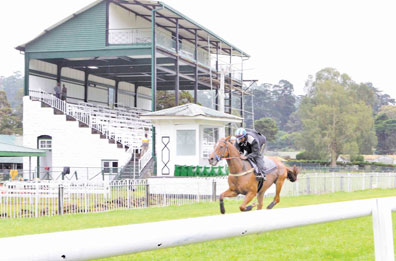
A jockey and his horse train at an early morning session |
When the race is flagged off on March 20, organisers are expected to
breathe a sigh of relief that horse deaths will be a thing of the past,
animal dope-testing will fall in line with international norms and
jockeys and groomers will be paid their wages in accordance with pledges
made by the newly formed Royal Turf Club (RTC) that replaced the
disputed Sri Lanka Turf Club (SLTC).
The RTC has already drawn up its racing calendar which lists as many
as 16 races to be worked off over a period of ten months compared to
just a solitary race run in April in the past when the SLTC held sway.
"These people (SLTC) could not even pay a simple water bill and this
alone shows the state that horse-racing was in. I dread to think of what
would have happened if this was made to continue", said RTC president
Suranjith Premadasa who claimed he lost the most when seven of his
thoroughbred horses died under mysterious circumstances.
He suspects rivals aligned with the now defunct SLTC to have poisoned
the animals to eliminate competition on the track.
"I can tell you what happened, but it is also something that I don't
want to talk about. It was a tragedy", said Premadasa who now wants to
prove that horse racing can be a noble sport.
The turn-around or rebirth of horse-racing may have commenced last
year when former Sports Minister Navin Dissanayake's anti-doping team
was thrown out from the Nuwara Eliya race course, or what was left of
it, in an outrageous act committed by the SLTC in total disregard for
international norms.
|
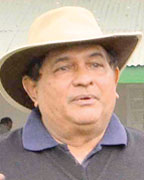
Premadasa: The whistle blower |
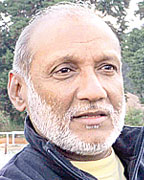
Abeyratne: Fled the scene
|
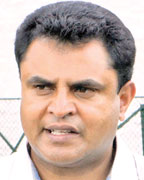
Mayor Dodampegamage: Saw it all |
|
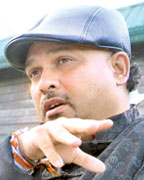
Navin Dissanayake: Had enough |
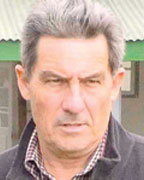
Wayne Wood: The judge
|
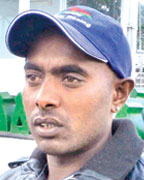
(Jockey) Dayalan: Survived
|
But what the SLTC did not realize was that they took on the wrong
horse as Dissanayake, now the Minister of Plantations and back in his
home town of Nuwara Eliya, called for a complete overhaul of
horse-racing on the lines of accountability and investment.
Decision-makers in the SLTC were caught on the wrong foot unable to
respond and so was born the Royal Turf Club.
"I have an independent vision for horse racing", declared Minister
Dissanayake. "I kept on insisting that we must develop the place (Nuwara
Eliya) and I got complaints that horses were doped, horses were dying
and I was fed up of all this. I want this (horse racing) to be run in a
professional way".
For Dissanayake, it's also about making his Nuwara Eliya third
generation electorate a well-marketed heartland opened to the world.
"I want a complete change for investment. Horse racing should not be
a fashionable occasion for a few people to have their photographs in a
magazine. It has to become a huge investment and in my lifetime I want
to see this track developed to international standards", said
Dissanayake.
His dream may just be beginning to take shape as the RTC has already
drawn up a Rs.100 million budget to give the race course and its
grandstand a facelift while additions like medical care, spectator
facilities, jockey and animal welfare are been given high priority.
Today jockeys and horse groomers are jumping for joy that they will
no longer have to struggle for a few bucks or leave their families to go
overseas to work their trade as they see the dawn of a new horizon.
"We were not paid but now I can look forward to a new career in
horse-racing. This is our family inheritance and we want to be in it",
said one jockey who identified himself as Dayalan.
One-time wealthy horse owners are also contemplating a comeback after
quitting the scene in abject disgust. One of them is Anurudh Abeyratne
who owned a dozen horses and is now keeping his fingers crossed.
"In horse racing, administration is the most important thing. We need
the confidence to comeback. The horse racing culture should be what it
was like in the colonial days", said Abeyratne.
The RTC may not be far from attempting to recreate the past as it has
already signed up a passionate expert from Australia in Wayne Wood who
is the club's Chief Executive Officer and Chairman of Stipendiary
Stewards. Wood will be in overall charge when it comes to ground
realities, horse welfare, dope-testing and eligibility.
"We want to make horse racing a people's sport. They can come and
make up their minds and we will do everything possible to make it
happen", said Wood.
For now it appears the horses are in safe hands. |

